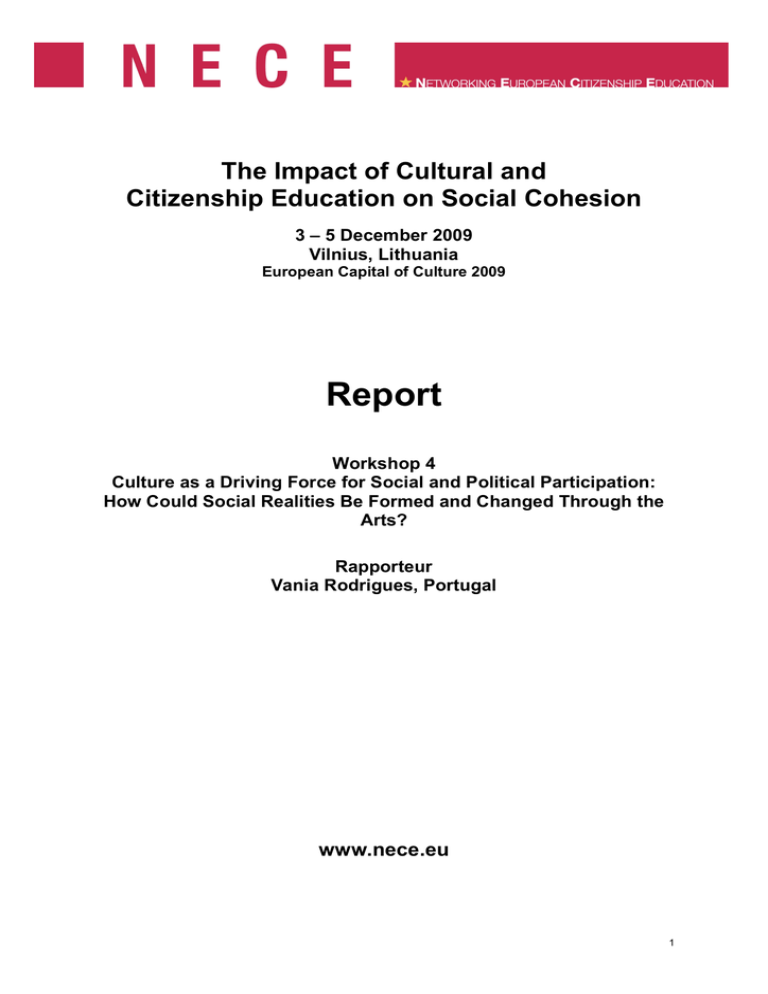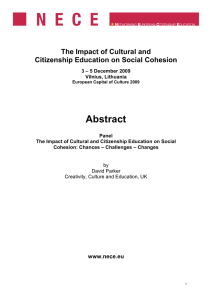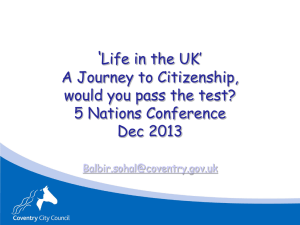Report The Impact of Cultural and Citizenship Education on Social Cohesion
advertisement

The Impact of Cultural and Citizenship Education on Social Cohesion 3 – 5 December 2009 Vilnius, Lithuania European Capital of Culture 2009 Report Workshop 4 Culture as a Driving Force for Social and Political Participation: How Could Social Realities Be Formed and Changed Through the Arts? Rapporteur Vania Rodrigues, Portugal www.nece.eu 1 Culture as a Driving Force for Social and Political Participation: How Could Social Realities Be Formed and Changed Through the Arts? Scientific Inputs: Ayse Gülec, Kulturzentrum Schlachthof (Germany) Project Presentations: Anastassia Makridou-Bretonneau & Sigrid Pawelke, New Patrons (France/ Germany) Moderation: Elona Bajoriniene, Emergency Fund of the Open Society Institute (Lithuania) Introduction The challenge of this workshop was to engage in a discussion about how social realities could be formed and changed through the arts. About twenty-two people, ranging from art educators to cultural managers, journalists and curators, attended the workshop and in the course of three hours tried to make sense of the issues at stake and to reflect upon if and how culture could actually be a driving force for social and political participation. The discussion was initiated by Dalia Siaulytiene, from the Ministry of Education of Lithuania, who accounted for the recent developments in art and citizenship education in the country. Sigrid Pawelke and Anastassia Makridou-Bretonneau, independent art curators, presented the ‘New Patrons’ project, which provided us with a practical background for the debate. Elona Bajoriniene, Programme Director of the Emergency Fund, Lithuania, and former Programme Director and General Director of the NGO “Vilnius – European Capital of Culture 2009”, was in charge of the moderation. Discussion Dalia Siaulytiene, who had been responsible for developing the concept of cultural and artistic education in Lithuania, started the workshop by characterizing the Lithuanian standing in terms of cultural education, and thus providing us with the national framework within which the core ideas of the workshop operate. Based on her solid professional experience, she readily identified three major influential trends in cultural education: one, arts and culture as vocational training; two, as part of general humanitarian education; and three, educative arts/culture, a practice which is closer to the participatory arts rationale. Although her discourse clearly put artistic education at the heart of education policies, some difficulties were identified: poor links with other ministries, especially with the Culture Ministry. A vivid example of the need for education and culture to co-operate more intensely in the future was the recent situation of the European Cultural Capital education programs, in which the Ministry of Education had not been involved. Yet another poignant point of criticism was the fact that most art schools were following very traditional, old programs, without adapting their practices to newly emerging forms. Dalia Siaulytiene’s closing remark recovered a significant point that had already been made during the opening of the Conference: that the Lithuanian society, having lived until fairly recently under an authoritarian regime, in which everybody was supposed to be alike, has only recently woken up to the discussion around ‘social cohesion’ – this concept is indeed only now becoming a part of the public sphere in Lithuania. Before we move on, we should make clear what the expression ‘social cohesion’ stands for in this context, given the poor delimitation of the concept in scientific research, where it is often called a ‘quasi-concept’, due to the fact that it remains vague and is used differently in various contexts and times. Indeed, one could argue that ‘social cohesion’ has come to include anything and everything that holds a society together. It has also often been defined from a negative perspective, as being synonymous to the absence of inequalities within a 2 society. The depth of this debate lies outside the scope of this report, therefore let us solely keep in mind that ‘social cohesion’ is a multi-dimensional concept, and for the sake of convenience bear in mind the Council of Europe’s definition of social cohesion as “the capacity of a society to ensure the well-being of all its members, minimizing disparities and avoiding marginalization.”1 Despite these interesting issues at stake, it is fair to say that the presentation of the ‘New Patrons’ project was the real trigger of the debate during the workshop. A contemporary art program in which citizens themselves commission an art work, based on their personal/local preoccupations, with the help of a Mediator and against the background of a ‘Manifesto’ which is commonly agreed upon and therefore not only gives contemporary creative activity a shared meaning but is also a tool to empower citizens. It is a true cultural and citizenship education project, based on collective negotiation and on the assumption of shared responsibilities – which is arguably an excellent context to bring active citizenship into action. The program has already involved residents in over 200 projects with artists of international renown in eight European countries – in the workshop the example was the village of Saint-Thélo in France. Sigrid Pawelke and Anastassia Makridou-Bretonneau passionately talked about how the project allowed the villagers to learn about sharing, how they gained new trust in others and confidence in themselves and changed the outlook of their village. The strong emotional engagement was part of the process of empowering the citizens, which is paramount to the whole program. Thus, this presentation reinforced the idea of culture and the arts not as consuming but as a possibility to change society. The following discussion had many different threads of reflection, but the main issues very much stemmed from this project presentation. The participants discussed if there was such a thing as a ‘social responsibility’ of the artist, reflected upon the contribution of art to increasing individual and community self-confidence and to putting people into action by bringing them to change the economic and political conditions of their lives. By a direct link to the aim of the workshop, there was a challenge whether there had been changes on the political level of engagement after people participated in the New Patrons program. The answer came almost in the form of a mission statement: the very basis of New Patrons is a political model – as the negotiation that takes place between the three players (commissioners, mediator, artist) is a kind of direct democracy – everybody has a shared responsibility. There was no consensus on whether this could be a model for political engagement, but there was agreement on some main points. Conclusion If a conclusion can be drawn, it is that cultural and citizenship education can effectively contribute to social and political participation, by acting as a catalyst, by giving the players the opportunity to think imaginatively and reflect critically or by giving them a concrete tool to act upon the concrete conditions of their lives. Nevertheless, some caveats are necessary: to realize this contribution, it is important to guarantee the quality and reach of cultural and citizenship education projects; to ensure that they are not misused in terms of national agendas; to secure continuity of funding; to clarify what the artists are expected to do when working in a community and to raise the prestige of artists who engage in this kind of projects (someone suggested there should be a special award for creative art in the communities). 1 Council of Europe, Report of High-Level Task Force on Social Cohesion, Council of Europe, 2008, Strasbourg, available from http://www.coe.int/t/dg3/ 3 The technological evolution, the diversity of cultures, the co-existence of identities within national boundaries, the emerging of hybrid identities due to migration are some of the inescapable challenges for cultural and citizenship education in the future. Bearing all this in mind, and having acknowledged these challenges, it can be stated that throughout the debate it was collectively argued in favour of a European citizenship that includes a sense of belonging, and it was concluded that, one, initiatives should come from empowered citizens, two, that there is a need to define citizenship more clearly inside the European Union and, three, that there is an urgent need to extend the horizons of citizenship education, by going beyond national agendas. 4




